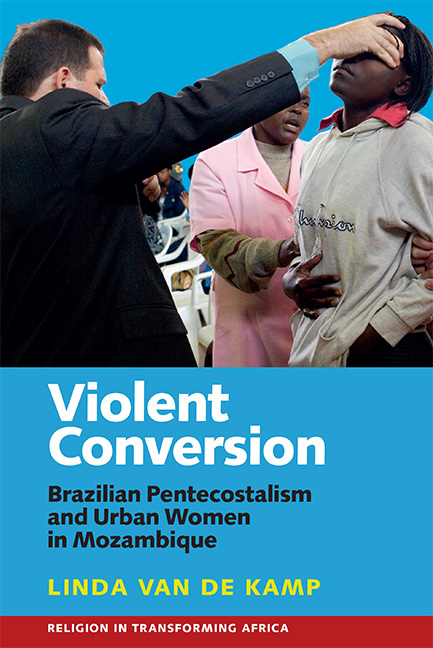Book contents
- Frontmatter
- Contents
- List of Illustrations
- Acknowledgements
- Introduction
- 1 Gender, Family and Social Transformations in Maputo
- 2 Transnational Spaces of Conquest
- 3 Moving Frontiers: the Generational Trajectories of Pentecostal Women
- 4 Converting the Spirit Spouse
- 5 Terapia Do Amor: Confrontational Public Love
- 6 ‘Holy Bonfires’ and Campaigns
- Conclusion: Violent Conversion
- Bibliography
- Index
Conclusion: Violent Conversion
Published online by Cambridge University Press: 24 October 2017
- Frontmatter
- Contents
- List of Illustrations
- Acknowledgements
- Introduction
- 1 Gender, Family and Social Transformations in Maputo
- 2 Transnational Spaces of Conquest
- 3 Moving Frontiers: the Generational Trajectories of Pentecostal Women
- 4 Converting the Spirit Spouse
- 5 Terapia Do Amor: Confrontational Public Love
- 6 ‘Holy Bonfires’ and Campaigns
- Conclusion: Violent Conversion
- Bibliography
- Index
Summary
In a shifting, uncertain but challenging urban environment, like that found in the Mozambican capital Maputo, upwardly mobile women are seeking to direct and control their new socio-economic and cultural positions. Uncertainties about possible new ways of life require critical cultural reflection by women, especially with regard to their dependence on kin and partners. Solutions to the ambiguities and difficulties that women face can be unclear and vague, yet ill-defined spaces provide people with opportunities for exploring and occupying spaces in new ways and even to create new ones (de Boeck and Plissart 2004; Cooper and Pratten 2015). Following Mozambique's socialist period, in the early post-independence period, when the government attempted to monitor its citizens and bring them under control, the current more liberal era is allowing people to look for new opportunities. Maputo can thus be seen as a pioneering society, where upwardly mobile women are exploring new possibilities to shape their lives. These women are seeking ways to gain new positions in the urban spaces that have been defined by colonial and post-colonial power structures that restricted opportunities for women in relation to professional careers, dependence on kin and sexual expressions. They are challenging the socio-cultural frontiers.
Brazilian Pentecostalism seems to connect well with a pioneering spirit. In the urban environment of Maputo, where everyone is busy claiming political, cultural and economic spaces, Pentecostals are conquering these terrains spiritually. By stamping their feet on the floor during church services and by burning demons, the converts drive away ‘evil others’ who might try to claim their life spaces. Pentecostals are busy creating new life spaces by breaking down boundaries, changing local marriage customs, severing relations with kin and ancestors and setting up businesses. Brazilian Pentecostal discourses and practices are persuading followers to move frontiers and take control of their lives and society through the power of the Holy Spirit.
The South–South transnational dimension of Brazilian Pentecostalism in Mozambique has turned out to be especially relevant for upwardly mobile women in their exploration of alternative lifestyles and their search for new socio-economic and cultural options. The particular openness of Brazilian pastors on issues such as love, marriage and sexuality, which are at the heart of the urban transformations that women experience, adds to the pastors’ spiritual and cross-cultural strengths.
- Type
- Chapter
- Information
- Violent ConversionBrazilian Pentecostalism and Urban Women in Mozambique, pp. 187 - 196Publisher: Boydell & BrewerPrint publication year: 2016

